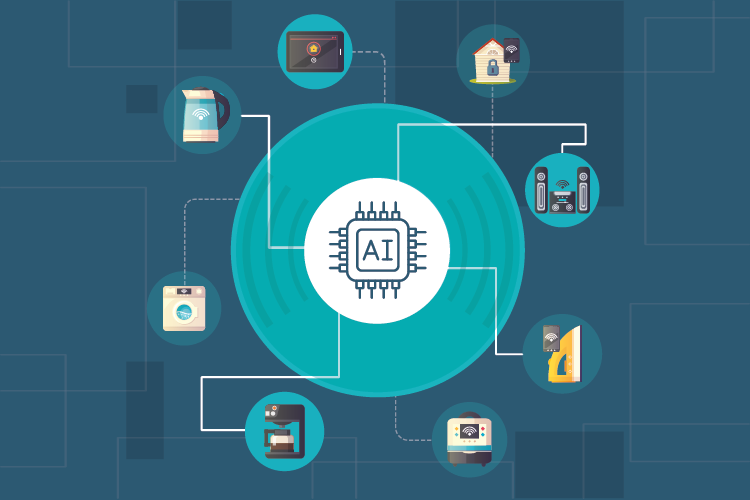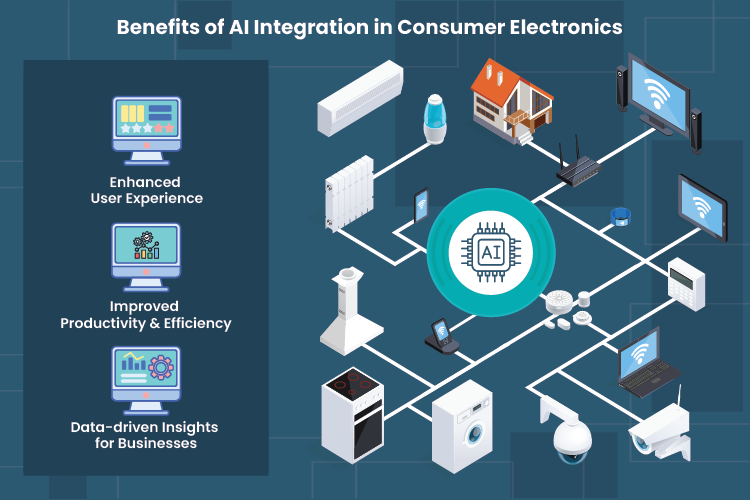

ACL Digital
The Role of Artificial Intelligence in Shaping the Future of Consumer Electronics
In the rapidly evolving world of consumer electronics, Artificial Intelligence (AI) stands as a transformative force driving unprecedented innovation and redefining user experiences. From the smart home gadgets to the wearable tech we rely on, AI is at the forefront of technological innovation, driving advancements that make our interactions with technology seamless and personalized. This blog delves into the myriad ways AI is shaping the future of consumer electronics, exploring its impact on various devices, the underlying technologies, and the profound benefits it brings to users. As we explore the intricate relationship between AI and consumer electronics, we will uncover how this synergy reshapes our interaction with everyday devices, promising a smarter and more connected world.

What are the Key Challenges of Integrating AI into Consumer Electronics?
Artificial Intelligence (AI) has transformed consumer electronics, offering advanced features and personalized experiences. However, the integration of AI in these devices presents significant challenges, particularly concerning consumer electronic data and privacy.
Data Privacy Concerns
One of the primary challenges in integrating AI into consumer electronics is ensuring the privacy and security of user data. Smart devices collect vast amounts of personal information, including browsing history, location data, and biometric identifiers. Protecting this data from unauthorized access and potential breaches is paramount.
Regulatory Compliance
Navigating the complex landscape of data privacy regulations adds another layer of challenge for developers. Regulations such as GDPR, CCPA, and HIPAA impose stringent requirements on data handling, storage, and consent mechanisms. Compliance with these regulations is essential to avoid legal repercussions and maintain consumer trust.
Ethical Considerations
Ethical dilemmas arise in the collection and use of consumer data by AI-powered devices. Developers must consider issues such as transparency, consent, and data minimization to uphold ethical standards. Balancing innovation with respect for user privacy is a delicate yet essential aspect of AI development in consumer electronics.
Technical Complexity
Implementing AI functionality in consumer electronics requires overcoming technical hurdles. Developers face challenges in designing efficient algorithms, optimizing performance, and managing computational resources. Additionally, ensuring interoperability and seamless integration across different devices adds to the complexity of AI development in consumer electronics.
How is AI Revolutionizing the Integration of Consumer Electronics Ecosystems?
Artificial Intelligence (AI) has revolutionized the consumer electronics industry by creating seamless ecosystems that enhance user experience and connectivity. By integrating AI into various devices, manufacturers are providing smarter, more efficient, and intuitive solutions that work together harmoniously. This integration spans across multiple types of consumer electronics, including smart home devices, wearables, entertainment systems, and more.
Seamless Connectivity
AI plays a pivotal role in ensuring that different consumer electronics devices can communicate and work together effortlessly. By utilizing machine learning algorithms and data analytics, AI can predict user behavior, optimize device settings, and facilitate smooth interaction between devices. This results in a more cohesive user experience, where devices are aware of each other’s status and can adjust their functionalities accordingly.
Cross-Device Functionality
- Smart Home Integration: AI-enabled smart home hubs like Amazon Echo or Google Home can control various devices such as lights, thermostats, security cameras, and appliances. These hubs use voice recognition and natural language processing to understand and execute user commands across different devices.
- Wearable Technology: AI in wearables like smartwatches and fitness trackers enables cross-device functionality by syncing data with smartphones, tablets, and even smart home devices. For example, a fitness tracker can share sleep data with a smart thermostat to adjust the room temperature for optimal sleep conditions.
- Entertainment Systems: AI enhances interoperability in entertainment systems. Smart TVs, for instance, can sync with streaming devices, gaming consoles, and sound systems to provide a unified entertainment experience. AI algorithms can recommend content based on viewing habits, and voice assistants can control all connected devices with a single command.
Improved User Experience
AI-driven ecosystem integration significantly improves the overall user experience by offering personalized and intuitive interactions. Here are a few examples:
Personalization: AI analyzes user preferences and behaviors to tailor device settings and recommendations. This could be as simple as adjusting the brightness of a smart light based on the time of day or as complex as curating a playlist that matches the user’s mood.
Predictive Maintenance: AI can monitor the health of consumer electronics and predict potential issues before they occur. For instance, a smart refrigerator can notify the user when it’s time to replace the water filter or alert them about a potential malfunction.
Energy Efficiency: AI can optimize energy consumption by coordinating the operation of various devices. Smart thermostats, for example, can learn the user’s schedule and adjust the temperature accordingly to save energy while maintaining comfort.
Benefits of AI Integration in Consumer Electronics
Artificial Intelligence (AI) integration in consumer electronics offers a plethora of benefits, revolutionizing user experience, productivity, efficiency, and business insights. Here are some key advantages:
Enhanced User Experience
AI enhances user experiences in consumer electronics by personalizing interactions and automating tasks. For example, smart speakers like Amazon Echo and Google Home use AI to understand natural language commands, providing hands-free control over smart home devices, music playback, and information retrieval. AI-driven cameras in smartphones optimize photo settings based on the scene, ensuring high-quality images effortlessly. This personalized and intuitive interaction elevates user satisfaction and usability.
Improved Productivity and Efficiency
AI-powered features in consumer electronics streamline tasks and improve efficiency. Virtual assistants, such as Siri and Google Assistant, help users manage schedules, set reminders, and perform internet searches, enhancing productivity. AI-driven smart home devices can automate routine tasks like adjusting lighting and thermostats based on user preferences, saving time and energy. In business settings, AI-enabled devices like smart displays and conferencing systems facilitate seamless communication and collaboration, boosting productivity.
Data-driven Insights for Businesses
AI integration in consumer electronics provides businesses with valuable data-driven insights. Smart devices collect user data, such as usage patterns and preferences, which can be analyzed to understand consumer behavior and tailor products and services accordingly.
For example, fitness trackers gather health data that can be used by health insurance companies to incentivize healthy lifestyles. Smart TVs collect viewing habits, which can be utilized by content providers for targeted advertising. These insights enable businesses to make informed decisions and improve their offerings, ultimately increasing customer satisfaction and loyalty.

The Future of AI in Consumer Electronics:
AI in consumer electronics will focus on three key areas: AI chip advancements, 5G integration, and sustainability. These developments will lead to smarter, more connected, and sustainable devices that enhance our lives while reducing environmental impact.
Advancements in AI Chipsets
The future of AI in consumer electronics is closely tied to advancements in AI chipsets. Manufacturers are developing specialized chips that can handle complex AI computations with greater efficiency and speed. These chips, known as neural processing units (NPUs) or AI accelerators, are designed to power AI applications in devices such as smartphones, smart home devices, and wearables. These advancements will enable devices to process AI tasks locally, reducing the need for cloud connectivity and improving overall performance.
Integration of AI with 5G Technology
The integration of AI with 5G technology is set to revolutionize consumer electronics. 5G networks offer ultra-fast speeds and low latency, making them ideal for AI applications that require real-time data processing. With 5G, devices can communicate and exchange data faster than ever before, enabling seamless integration of AI-powered features such as augmented reality (AR), virtual reality (VR), and autonomous driving. This integration will unlock new possibilities for AI in consumer electronics, enhancing user experiences and driving innovation.
AI in Sustainable Consumer Electronics
Sustainability is a key focus in the future of consumer electronics, and AI is playing a crucial role in driving sustainability initiatives. AI-powered devices can optimize energy consumption, reduce waste, and improve recycling efforts. For example, smart appliances can adjust their settings based on usage patterns to conserve energy, while AI algorithms can optimize supply chains to reduce carbon footprint. As consumer demand for sustainable products grows, AI will continue to drive innovation in this area, leading to a more environmentally friendly future for consumer electronics.
About ACL Digital:
ACL Digital is a design-led company with extensive experience in the AI and Consumer Electronics industries. We have successfully assisted numerous clients in the Consumer Electronics industry, designing and developing their next-generation solutions. Our expertise in AI has enabled us to create innovative and efficient products that enhance user experiences and drive business growth. With a focus on cutting-edge technologies and a deep understanding of consumer needs, ACL Digital is poised to continue shaping the future of Consumer Electronics through AI-driven solutions.
Explore our case studies for deeper insights into our experience and expertise. Feel free to connect with us.
Related Insights


How Generative AI is Transforming Project Risk Management

Death to Prompting! Long Live Programming!

The Architecture of Agentic RAG: Reasoning-Driven AI Systems Explained

The Rise of CloudOps: Managed Services Driving Cloud-Native Success

